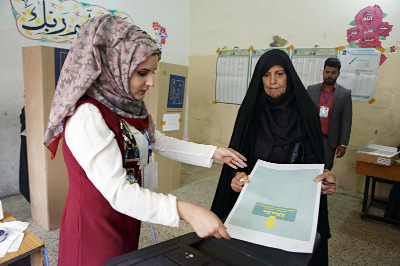
Reuters, Baghdad :
Iraqis voted in the first election on Saturday since defeating Islamic State, but few people expect its new leaders to
stabilize a country beset by conflicts, economic hardship and corruption since the fall of Saddam Hussein in 2003.
Depending on the outcome, the poll could bolster Iran’s role in Iraq and the Middle East.
Aside from geopolitics that have deepened sectarian divisions, Iraq faces an array of challenges after a three-year war against Islamic State which cost the country about $100 billion.
Much of the biggest northern city of Mosul was reduced to rubble. Security is still threatened by sectarian tensions, which erupted into a 2006-2007 civil war at the height of a 2003-2011 U.S. occupation.
The election’s victors will have to contend with the fallout from U.S. President Donald Trump’s decision to pull out of the nuclear deal with Iran, a move that raised fears among Iraqis that their country will be a theater of conflict between Washington and Tehran.
The three main ethnic and religious groups-the majority Shi’ite Arabs and minority Sunni Arabs and Kurds-have been at odds for decades, and sectarian divisions remain as deep as ever even though they joined forces to fight Islamic State.
“I will participate but I will mark an ‘X’ on my ballot. There is no security, no jobs, no services. Candidates are just looking to line up their pockets, not to help people,” said Jamal Mowasawi, a 61-year-old butcher.
The three main candidates for prime minister, all Shi’ites, are incumbent Haider al-Abadi, his predecessor Nuri al-Maliki and Shi’ite militia commander Hadi al-Amiri. All need the support of Iran, which has economic and military sway in Iraq as the primary Shi’ite power in the region.
Abadi is considered by analysts to be marginally ahead, but victory is far from certain for the man who raised hopes that he could forge unity when he came to office.
In office he reached out to minority Sunnis but alienated Kurds after crushing their bid for independence. He improved his standing with the victory against Islamic State, which had occupied a third of Iraq.
But Abadi lacks charisma and has failed to improve the economy and tackle corruption. He also cannot rely solely on votes from his community as the Shi’ite voter base is unusually split this year. Instead, he is looking to draw support from other groups.
Even if Abadi’s Victory Alliance list wins the most seats, he still has to negotiate a coalition government, which must be formed within 90 days of the election.
Amiri, 63, spent more than two decades fighting Saddam from exile in Iran and leads the Badr Organisation, the backbone of the volunteer forces that fought Islamic State. Victory for Amiri would be a win for Iran, which is locked in proxy wars for influence across the Middle East with Saudi Arabia.
Iraqis voted in the first election on Saturday since defeating Islamic State, but few people expect its new leaders to
stabilize a country beset by conflicts, economic hardship and corruption since the fall of Saddam Hussein in 2003.
Depending on the outcome, the poll could bolster Iran’s role in Iraq and the Middle East.
Aside from geopolitics that have deepened sectarian divisions, Iraq faces an array of challenges after a three-year war against Islamic State which cost the country about $100 billion.
Much of the biggest northern city of Mosul was reduced to rubble. Security is still threatened by sectarian tensions, which erupted into a 2006-2007 civil war at the height of a 2003-2011 U.S. occupation.
The election’s victors will have to contend with the fallout from U.S. President Donald Trump’s decision to pull out of the nuclear deal with Iran, a move that raised fears among Iraqis that their country will be a theater of conflict between Washington and Tehran.
The three main ethnic and religious groups-the majority Shi’ite Arabs and minority Sunni Arabs and Kurds-have been at odds for decades, and sectarian divisions remain as deep as ever even though they joined forces to fight Islamic State.
“I will participate but I will mark an ‘X’ on my ballot. There is no security, no jobs, no services. Candidates are just looking to line up their pockets, not to help people,” said Jamal Mowasawi, a 61-year-old butcher.
The three main candidates for prime minister, all Shi’ites, are incumbent Haider al-Abadi, his predecessor Nuri al-Maliki and Shi’ite militia commander Hadi al-Amiri. All need the support of Iran, which has economic and military sway in Iraq as the primary Shi’ite power in the region.
Abadi is considered by analysts to be marginally ahead, but victory is far from certain for the man who raised hopes that he could forge unity when he came to office.
In office he reached out to minority Sunnis but alienated Kurds after crushing their bid for independence. He improved his standing with the victory against Islamic State, which had occupied a third of Iraq.
But Abadi lacks charisma and has failed to improve the economy and tackle corruption. He also cannot rely solely on votes from his community as the Shi’ite voter base is unusually split this year. Instead, he is looking to draw support from other groups.
Even if Abadi’s Victory Alliance list wins the most seats, he still has to negotiate a coalition government, which must be formed within 90 days of the election.
Amiri, 63, spent more than two decades fighting Saddam from exile in Iran and leads the Badr Organisation, the backbone of the volunteer forces that fought Islamic State. Victory for Amiri would be a win for Iran, which is locked in proxy wars for influence across the Middle East with Saudi Arabia.

